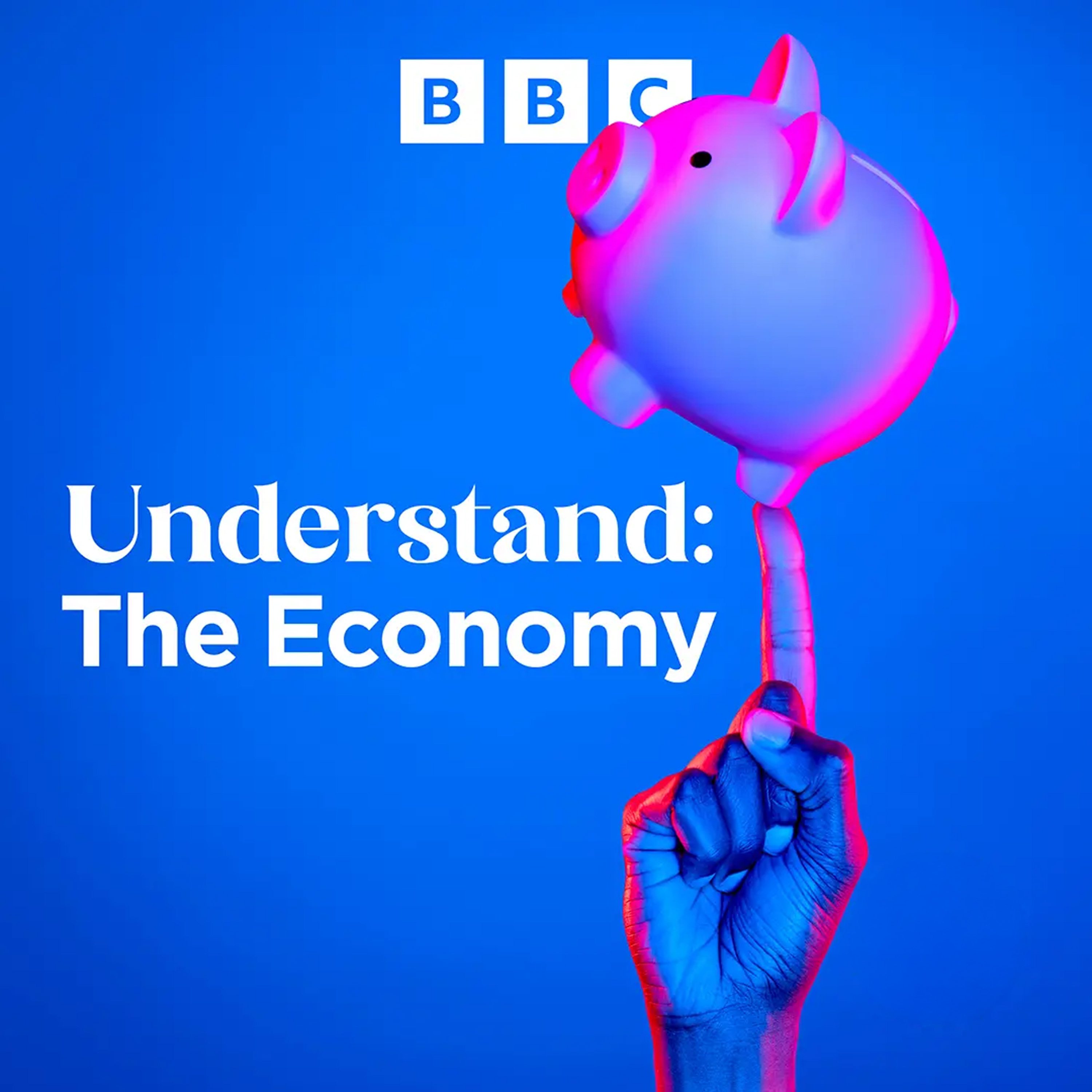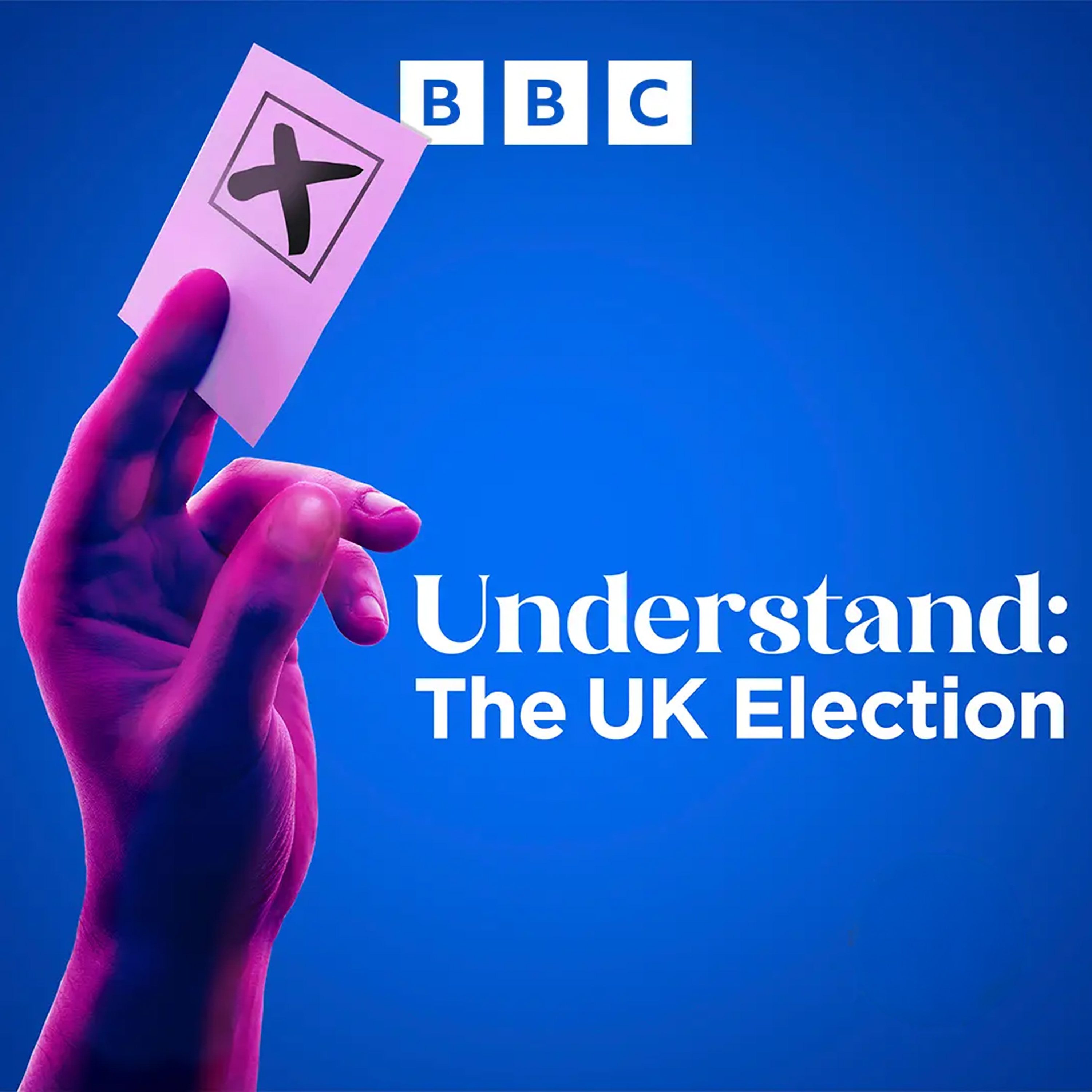The Economy: 9. International Trade and Currency Markets
The reason we can eat pineapples and sell aeroplane parts. But why might the value of the pound fall and what does that mean if it does? Tim Harford explains who wins and who loses if the pound is cheap against the dollar and economic historian Victoria Bateman tells the story of a trade deal with Portugal that flooded England with wine and Port.
Everything you need to know about the economy and what it means for you. This podcast will cut through the jargon to bring you clarity and ensure you finally understand all those complicated terms and phrases you hear on the news. Inflation, GDP, Interest rates, and bonds, Tim Harford and friends explain them all. We’ll ensure you understand what’s going on today, why your shopping is getting more expensive or why your pay doesn’t cover your bills. We’ll also bring you surprising histories, from the war hungry Kings who have shaped how things are counted today to the greedy merchants flooding Spain with Silver coins. So if your eyes usually glaze over when someone says ‘cutting taxes stimulates growth’, fear no more, we’ve got you covered.
Guest: Professor Richard Davies, The University of Bristol
Producer: Phoebe Keane
Researcher: Drew Hyndman
Editor: Clare Fordham
Theme music: Don’t Fret, Beats Fresh Music
A BBC Long Form Audio Production for BBC Radio 4
Press play and read along
Transcript
Speaker 1 This BBC podcast is supported by ads outside the UK.
Speaker 2 The Mercedes-Benz Dream Days are back with offers on vehicles like the 2025 E-Class, C-L-E-Coupe, C-Class, and EQE sedan. Hurry in now through July 31st.
Speaker 3 Visit your local authorized dealer or learn more at mbusa.com slash dream.
Speaker 4
A happy place comes in many colors. Whatever your color, bring happiness home with CertaPro Painters.
Get started today at Certapro.com.
Speaker 4 Each Certipro Painters business is independently owned and operated. Contractor license and registration information is available at Certapro.com.
Speaker 5 BBC Sounds, Music, Radio, Podcasts.
Speaker 1 Welcome to Understand the Economy, the podcast that takes you back to basics to explain how economics affects our everyday lives.
Speaker 1 This episode, let's talk about one of the most fundamental ideas in economics and a topic where our everyday intuitions and what economists believe seem to be very far apart.
Speaker 1 Fortunately, Richard Davis is here again to talk us through it.
Speaker 1 He is a professor of economics at Bristol University and the author of Extreme Economies, what life at the world's margins can teach us about our own future. Richard, welcome back to the programme.
Speaker 3 Hi there.
Speaker 1 Before we talk about international trade, maybe we should talk about, about, well, just trade, because this is a really important idea in understanding how an economy, well, even is an economy.
Speaker 1 So let's just imagine that you and I find ourselves sharing a house in what is probably the world's worst idea for a reality TV show.
Speaker 1
Two economists house share in Swindon. And there are two basic jobs.
There's cooking and there's cleaning. And we could just agree, we'll take it in turns.
Speaker 1
One day you cook and I clean, and then the next day I cook and you clean. Simple.
But what if it turns out that you're a great cook and that I'm not? How might we trade to improve our situation?
Speaker 3 This is the key idea behind trade, which is that people's skills and abilities differ.
Speaker 3 So you'd want the person that was interested in cooking and a great chef and had good ideas for recipes doing all the cooking, and the person who was good at cleaning to do the cleaning.
Speaker 3 If you varied it, so one person did it each day and you altered one off, one on, then you're going to end up with a lower quality of cleaning and a lower quality of eating I think this is the counterintuitive thing about comparative advantage though because I think we we think
Speaker 1 oh well some people are just better at everything or some countries are just better at everything and they'll end up doing everything and the other people will end up doing nothing they'll have no jobs but when you unleash the power of trade everybody finds their niche at least that's the way it's supposed to work that's the way it works in the economics textbooks that's exactly right perhaps the simplest thing is to just think of the weather.
Speaker 3 So some countries are unable to produce certain things, certain types of fruit, for example. We don't grow bananas or pineapples in the UK.
Speaker 3 And so we're terrible in terms of producing those kind of soft fruits. And so naturally, we're going to end up needing to import those things.
Speaker 1 And that gets us, I guess, to this question of international trade. We should talk about pineapples, shouldn't we? Pineapples are a fascinating example of this.
Speaker 3 Pineapples are one of the earliest examples of why trade is valuable. So, when the pineapple arrived on the scene in London, it caused great kind of outcry and surprise.
Speaker 3 It was just the most delicious thing that anybody had ever tasted. And it became a symbol of trade and a symbol of wealth.
Speaker 3 So, if you look around, particularly in London, but in other major cities, you'll see on the facade of some buildings they're adorned with pineapples.
Speaker 3 And that's precisely because if you were a rich trader, you were able to provide those things to your guests.
Speaker 3 But it's also just an indication of there are some things that the UK couldn't do, and that's one. But there are lots of others.
Speaker 3 So, another big reason for international trade would be natural resources.
Speaker 3 So, take a country like Chile, the ground underneath Chile is full of copper, and so it's natural that Chile is going to be a copper exporter.
Speaker 3 But then, also for advanced economies, it's going to be things like innovation and specialization of your manufacturing sector. Which things globally are you particularly good at doing?
Speaker 1 So you have this classic idea that the British might export, I don't know, insurance and might import pineapples. But in the modern world, it's vastly more complex than that.
Speaker 1 We're importing and exporting
Speaker 1 components of brakes or steering wheels, and then we're assembling them, and then we're exporting them, and they're being reassembled, and we're importing them again.
Speaker 1 So products are going backwards and forwards across borders. I suppose this then makes what happens at the border incredibly important.
Speaker 3
Yes, and this is where trade deals come into play. So things cross borders.
So to give the actual picture, for the UK, the big port is Felixstowe. So lots of stuff will be going out of Felixstowe.
Speaker 3 And let's suppose we're trading with somewhere in Europe. Well, Rotterdam is the big port there.
Speaker 3 So things are going to be going from the factory in the UK, travelling overland, end up on a ship and make this journey from Felixstowe to Rotterdam. And as they do, pass these border checks.
Speaker 3 And those things can be easier or harder to get through.
Speaker 1
So not just a case of tariffs. I mean, tariffs are taxes that are imposed.
And, you know, when I studied international trade as a young economist, it was all about the tariffs.
Speaker 1
It was all about these taxes that we were told that Japan would have a tariff of 950% on rice. And the idea there is...
that is to protect Japanese rice producers against imported rice from Brazil.
Speaker 1
But the story you're telling us is it's way more than just the tariff rates. It's all the paperwork that's happening.
And I suppose this ties in to the ongoing Brexit negotiations.
Speaker 3 That's why sometimes you see it talked about as protectionism.
Speaker 3 You put in place a high tariff that's going to block trade and might protect your domestic industry, which you might want to do for political or other reasons.
Speaker 3 The more common thing today, because we have something called the World Trade Organization, that's actually been relatively successful in getting the average rate of tariffs down to be pretty low, is something called non-tariff barriers.
Speaker 3
Basically, what that means is anything else that can slow down trade. Really important ones would be regulations.
So, for example, the way that electrical wiring works.
Speaker 3 You know, we have different types of plug and different requirements over voltage in the UK versus the US, for example.
Speaker 3 And another one, really important one, would be the so-called sanitary or cytosanitary conditions. And these apply to anything that's plant or animal-based.
Speaker 3 And it's about ensuring that people have the right animal welfare standards, for example. That all has to be checked in detail at the border, and that kind of thing can slow down trade.
Speaker 1
And one of my favorite trade deals happened quite a while ago. Here's Dr.
Victoria Bateman from the University of Cambridge with a history.
Speaker 5 In the early 1700s, Britain was at war with France and it had banned imports of French wine.
Speaker 5 At the same time, Portugal had banned imports of foreign cloth in an effort to try and encourage its own domestic woolen cloth industry.
Speaker 5 And so all of this was adversely affecting trade.
Speaker 5 So on December the 27th, 1703, John Mathewen signed a trade treaty with Portugal on behalf of England, with the idea of allowing freer trade between the two countries, specifically the export of Portuguese wine into England in exchange for English woolen cloth destined for Portugal.
Speaker 5 Whereas previously Portugal had banned the wearing of foreign cloth, now after the treaty, English cloth could enter Portugal without being banned and without being subjected to a duty to a tax.
Speaker 5 And whereas previously the English had taxed Portuguese wine very highly, now Portuguese wine could enter English markets at a duty that was much lower than other wines such as French wine.
Speaker 5 Naturally, as you might expect, Britain's cloth industry benefited greatly from this treaty to the point that exports to Portugal tripled from the early 1700s through to the 1730s. And by 1717, 66%
Speaker 5 of English wine imports were from Portugal.
Speaker 5 The British had this great appetite for port and so on the back of this treaty we see the development of port and with it British port drinking and I guess all the gout that goes with it.
Speaker 1 Hmm, I was enjoying that story until we got to the gout.
Speaker 1 Richard Davis, let's put the port and the gout behind us and let's talk about currencies. In the UK we use the pound sterling, the US uses dollars, Europe has the Euro.
Speaker 1 So why do we have these different currencies? Why don't we have a single world currency?
Speaker 3 Well, setting the value of currency, which is what a central bank does, is a really important tool for fine-tuning the economy. So for dealing with recessions.
Speaker 3 And importantly, we don't think that recessions happen at the same time and for the same reason and in the same places across the world.
Speaker 3 If they did, in a hypothetical world in which all recessions were global and they always happened at the same time, then you could have a global central bank.
Speaker 3 But in a situation in which countries specialize, as we're discussing, then countries are going to have individually focused recessions and booms and so they want to have as many tools as possible to provide a stimulus when they're in a recession or to put on the brakes when they're in a boom and this is why countries have historically sought to keep control of their currency so purely hypothetically let's say pounds sterling lurches downwards I can't think of a reason why that would happen.
Speaker 1 But let's say
Speaker 1 just to say, hypothetically, it lurches downwards. How does that affect our trade with the rest of the world?
Speaker 3 So take a UK company that's exporting something, say a record player. So high-end record players is something the UK is very good at making and will be exporting lots of them.
Speaker 3 And it has a certain cost, let's say £1,000.
Speaker 3
It's exporting them to France. The value of the UK currency goes down.
So that means it's cheaper for the record lover in France to buy it used to be 1400 euros and now it's well 1200
Speaker 1 1100 so so it's a better deal for them and that means either they'll buy more or it means the British company can jack up their prices without their customers even really noticing I see a problem though because when I'm now buying this Portuguese port that I'm so very fond of that's priced in euros and it might be I don't know 10 euros a bottle.
Speaker 1
I don't really buy expensive port. That used to be six quid.
it's now it's nine quid.
Speaker 1 That's gone up in price because the pound has gone down and because it's just harder and harder for me to afford the 10 euros.
Speaker 1 So, what impact is that going to have when I walk through Tesco or Sainsbury?
Speaker 3 So, it's going to be inflationary, um, following through your example.
Speaker 3 And so, this is the cost that everybody, when they're doing their shopping and they're facing any goods that the UK imports, and again, because of the complex supply chains we have, lots of things we might think are made in the UK contain imports.
Speaker 3 So a UK-produced car, for example, contains within it lots of things that are imported. When the currency has depreciated, its value has gone down.
Speaker 3 It means it's more costly to import things and it's going to lead to inflation.
Speaker 1 Why do currencies appreciate, go up or depreciate, go down?
Speaker 3 So the price of currencies is going to be set according to supply and demand for them. So why would people demand pounds? Why would they need them?
Speaker 3 It's because they want to buy something that is priced in pounds. And that could be the turntable that we discussed.
Speaker 3 It could be a British-made car, or it could be somebody coming in from abroad and wanting to invest in British stocks and shares, or invest in UK bonds, either from the government or a company.
Speaker 3 And if those things look less attractive, so for example, if the UK is seen to be going into a recession, maybe its companies look less attractive.
Speaker 3 If the UK's interest rates on its bonds are lower than those in the US, those bonds look less attractive.
Speaker 3 And the overall demand for the currency that's needed to buy those British priced things will go down.
Speaker 3 This then takes us to the currency markets where exchange rates are based on the interplay, the supply and demand for different currencies.
Speaker 3 Then the demand for pounds, because people want to buy fewer of these pound priced items, goes down and the overall price of the pound itself goes down.
Speaker 3 And that's what's happening when we get a depreciation.
Speaker 1 Professor Richard Davis of the University of Bristol. So, international trade means you can eat pineapples, and we can sell our very fancy turntables.
Speaker 1 If the value of the pound falls, the things we sell to others become cheaper. And it means the things we want to import, that we want to buy, become more expensive.
Speaker 1
And we will see the cost of that on the supermarket shelves. Next time, we'll talk about inequality.
Why do some people have so much and others have so little?
Speaker 1 Understand the Economy was presented by me, Tim Harford, and produced by Phoebe Keene. The researcher was Drew Hindman, and the series editor was Claire Fordham.
Speaker 6 Hello, I'm Martin Lewis, Money Saving Expert, and I've got a new podcast on BBC Sounds.
Speaker 6 I'll be giving you up-to-date information, strategies, and help to keep more cash in your pocket and hopefully reduce the stresses too.
Speaker 6 So whether it's mortgages, train fares, interest rates, government help schemes, consumer rights, or even with grand parental childcare credit, I'll try to cover what's needed and I'll take any of your questions you want to ask as well.
Speaker 6
Oh, as for what's the podcast called? We did a lot of thinking. It's clever.
Wait. The Martin Lewis podcast on BBC Sounds.
Speaker 4
A happy place comes in many colors. Whatever your color, bring happiness home with CertaPro Painters.
Get started today at Certapro.com.
Speaker 4 Each Certipro Painters business is independently owned and operated. Contractor license and registration information is available at Certapro.com.


